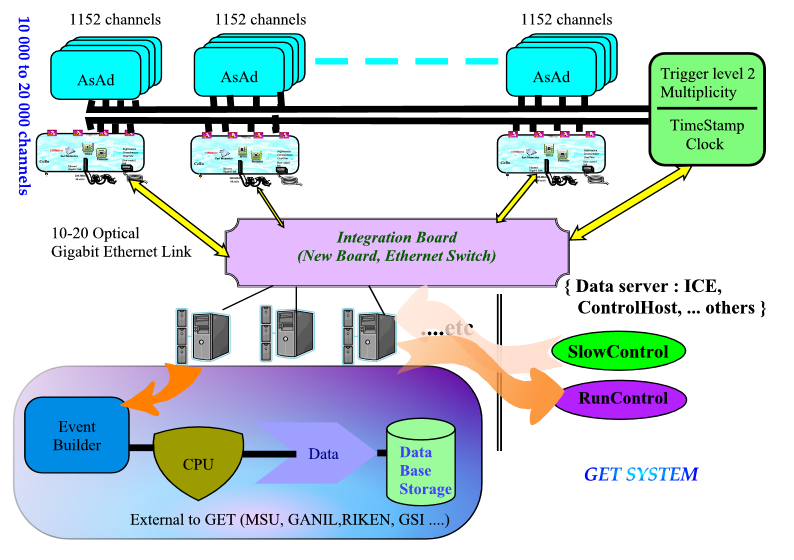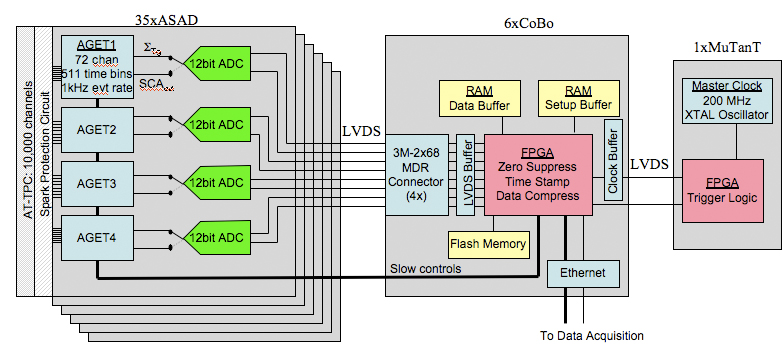Table of Contents
Deprecated Page
This page is no longer maintained For up to date information, please see New Wiki.
The electronics chain for the AT-TPC readout are being developed in conjunction with a number of outside collaborators, including (but not limited to):
Le Centre d'Etudes Nucléaires de Bordeaux Gradignan (CENBG)
Grand Accelerateur National d’Ions Lourds (GANIL)
Institute of Research into the Fundamental Laws of the Universe (IRFU)
National Superconducting Cyclotron Laboratory (NSCL)
An ANR proposal for the research and development required to design & test the electronics chain has been submitted to cover the work to be done at the French institutions. A copy of this proposal is linked here .
eDoc server
DOCUMENTATION TEMPLATE
To be standard on all laboratories, two template are proposed to write requirement for each board and software and to define physical interface between board and how to communicate with each others. In each document, there is examples.


Conceptual Design report
The goal of a CDR is to have all requirement in terms of physics and technical aspect.
You must present all possible solution and what to do to validate them. You do not have to go deeply on the implementation of the solution. The implementation concerns the TDR (technical design report) which will be written as soon as we got a prototype, validating one unique solution.

General Electronics for TPC's (GET)

Proposal for board identification
GET and MicroTCA a first approach
Global µTCA architecture v1.0 GANIL/GAP September 9, 2009
Saclay Proposal : GET description
Here is a beginning of GET description following all discussion we had. It is a preliminary document which will evolve until we reach a complete description of all the electronic functions we have to built for GET.
This document is still largely incomplete and is expected to serve only a a basis for detailed technical discussions.
Saclay proposal for GET system Frédéric Druillole & Shebli Anvar, February 24, 2009
Asic for GET (AGET)
ASic ADc (ASAD)

Electromechanics proposal including ASAD spatial distribution by J. Pibernat CENBG 2008,Dec,10
AsAd Specification
AsAd context
High speed diff SAMTEC
samtec_caracterisation
cable & connectors
VHDCI double connectors
Concentration Board (CoBo)
Specifications for the concentration board were discussed at the September 25th meeting. Included in the slides from this meeting was a list of the components, connectors and functionality of the board. A soft link to these files can be found here.
The CoBo is responsible for applying a time stamp, zero suppression and compression algorithms to the data. These operations will be conducted within an FPGA that is housed on the board. Furthermore, the CoBo provides a communication interface between external devices and the ASAD.
Zero Suppression: necessary to reduce the data volume to manageable levels; a factor of 10-100 rejection ratio is expected depending on the experimental applications.
Time Stamping: critical to reconstruction of zero suppressed data from multiple sources; the clock time will be provided by the Mutant module to each CoBo.
Data Compression: application of a peak fitting routine will allow only the signal amplitude, width and centre of gravity to be transmitted off the CoBo
Multiplicity Integration: sum the multiplicity signal over a sliding time window from each ASAD and transmit signal to MuTanT for trigger decision
Trigger Signal Communication: act as an intermediary to send trigger signal to the ASAD from the MuTanT
Slow Controls Communication: act as an intermediary to send slow controls signals to and from the ASAD
To accomplish the specified tasks the CoBo card will consist primarily of a large memory FPGA chip, flash memory, RAM buffer, clock buffer and the requisite signal and power connectors. A rough layout of the required components is shown below. A Virtex 5 LXT development kit has been purchased to evaluate the FPGA programming required and aid in the board design.

Break-down of CoBo development tasks and development timeline -- June 23, 2009
Integration Board (InBo)
Multiplicity, Trigger and Time Card (MuTanT)
Interfacing LVPECL 3.3V Drivers with 2.5V Differential Receivers
A Comparison of LVDS, CMOS, and ECL
A first level of specifications (draft version) -- G.Wittwer-GANIL, March 2, 2009
Proposed connectors from MUTANT to CoBo
Back End Module (BEM)
First Level Trigger
base of discussion for july 2008 on mainly asic specifications
Proposal for digital multiplicity design
NOTE: see minutes from trigger meetings for an up-to-date discussion of the status of the trigger plans (link)
Software
This document is still largely incomplete and is expected to serve as a basis for detailed technical discussions.
GANIL proposal for software general overview -- Frédéric Saillant, Bruno Raine, March 4, 2009
MicroTCA Information
Information provided by Performance Technologies Representative regarding MicroTCA applications and their product line is linked
here.
Information on µTCA crates and MCH modules
Requirements for MSU Detector
Wolfi's slides from ACTAR Meeting March, 2008
Electronics Overview & Questions, Abby, April 29, 2008
Event Time Sequence, Wolfi, May 1, 2008
FPGA Pipeline, Nathan, May 1, 2008
Structure of Data Flow, Nathan, May 13, 2008
Requirements for ACTAR Detector
- This is the ACTAR document prepared for the Scientific Council of the IN2P3. It contains a description of the instrument (not detailed at this stage), with a list of desired performances. Some physics cases are elaborated in detail. Version as of 19/06/09
- The following file summarized information about specification for MSU, CENBG and ACTAR TPC detectors. It is in Excell. It must be the first document to elaborate specification for new electronics. (Responsibility: F. Druillole)
- Below is the specifications file for the connector proposed by the Bordeaux group to be used between the pad plane and FEC. The key to this connector is the small width.
Examples from other TPC Projects
The following experiments provide examples of working electronics systems for TPC's.
Meetings & Presentations
ACTAR Collaboration Meeting, Santiago, March 10-11, 2008
Video Conference, May 15, 2008
Video Conference, June 3, 2008
ACTAR Collaboration Meeting, Bordeaux, June 16 - 18, 2008
Trigger Meeting, July 16, 2008
CoBo Meeting, September 25, 2008
Trigger Meeting, October 10, 2008
Trigger Meeting, November 18, 2008
ASAD Meeting, November 25, 2008
Software Meeting, November 25, 2008
GET Collaboration Meeting, March 10-13, 2009
Informal Meeting, Grand Rapids, May 28, 2009
Riken document
GET Technical workshop Bordeaux, November 18-19, 2009
GET telephone meeting, March 15, 2010 ZAP integration for AT-TPC
Every 2 weeks meetings
The second and fourth Tuesday of each month a visio/phone conference is held, from 14:00 to 16:00
Any person involved in the development of GET (Electro-Mechanic, Asad, Cobo, MUTANT, BEM, InBo, Data Acquisition) is cordially invited to participate.
Please, follow the link for schedule and connection numbers.
Periodic meetings


